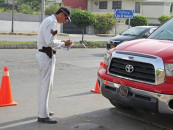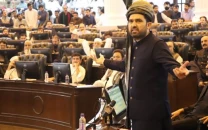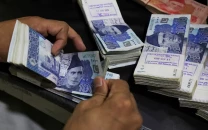NADRA keeps the deceased alive in its records
Delays in cancelling the identity cards of the deceased cause legal issues for families

Long after families have fulfilled the last rites of their deceased loved ones, many remain alive in NADRA's official records thanks to delays in the cancellation of their national identity cards, which create unnecessary inconveniences for the surviving kin.
One such citizen was Majid Hussain, who was facing difficulties selling his late father's property. "When I tried selling the shops registered under my father's name, a person claimed that the shops were mortgaged for a loan of Rs5 million. He even presented forged documents. Despite a case filed in court, the issue remains unresolved since my father's ID card was not cancelled in NADRA's records," lamented Hussain.
Similarly, Nabeela Kausar faced issues updating her surname on her CNIC since her father's death was not registered with NADRA. "I visited the NADRA office to replace my father's name with my husband's name but was asked to provide my parents' original CNICs. When I informed them of my parents' death, the officials instructed me to cancel their CNICs before updating my record," claimed Kausar.
According to the National Database & Registration Authority (NADRA), despite the registration of over 100 million deaths in the provincial civil registration and management system, the identity cards of these individuals have not been cancelled in NADRA's records, instigating a host of legal and administrative problems for the kin of the deceased.
Conversely, the failure to cancel the deceased individuals' CNICs has led to irregularities in various welfare programs as well. In the Punjab Government's Ramadan Nigahban Program, hundreds of cheques worth Rs10,000 were issued in the name of individuals who had passed away, depriving many families from receiving aid.
Legal experts believe that the failure to cancel a deceased person's identity card can create a host of problems for their heirs. While this can prevent many legal heirs from obtaining property, it can also enable forgery, allowing unauthorized individuals to seize properties or withdraw money from bank accounts.
Furthermore, if a government employee's identity card is not canceled, their pension and other benefits can be obtained illegally. In addition, there is a risk of electoral irregularities due to the inclusion of deceased persons in the voter list in the records of the Election Commission.
Senior lawyer Altamash Saeed informed this correspondent that NADRA's records were linked to various government databases. "If a person's death is not registered, it can create complications in immigration and other legal matters. Hence, NADRA should empower local union councils to directly update birth, death, marriage, and divorce records in NADRA's database. This would help citizens avoid unnecessary difficulties," opined Saeed.
Reportedly, NADRA has introduced an SMS notification system to involve citizens in the posthumous process, informing close relatives of deceased individuals to visit NADRA registration centers to cancel their identity cards. A public awareness campaign is also underway, utilizing social media, print, and electronic media to disseminate this information.
Under new regulations, the parents, spouse, children, siblings, or other close relatives listed in the deceased's family record can cancel the ID card. The required documents include the original ID card or its number, a computerized death certificate issued by the Union Council, Cantonment Board, or Tehsil Municipal Office, and a burial certificate.
"Canceling an identity card is free of charge, and the cancellation certificate is issued within seven days. To prevent misuse, the original identity card is destroyed at the NADRA registration center. Authorities urge citizens to take timely action to prevent potential forgery and ensure the accuracy of government records," claimed officials from NADRA.




















COMMENTS
Comments are moderated and generally will be posted if they are on-topic and not abusive.
For more information, please see our Comments FAQ